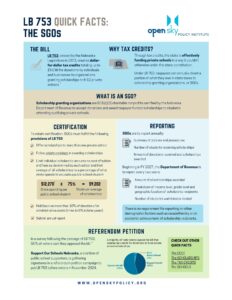After repeated attempts to pass school privatization measures had failed, Nebraska lawmakers in 2023 approved LB 753, which creates dollar-for-dollar tax credits totaling up to $100 million for donations to organizations granting private school scholarships.
 Earlier this month, OpenSky Policy Institute reviewed the key components of LB 753, including a look at the cost of the program, the scholarships and the tax credits that are funding them.
Earlier this month, OpenSky Policy Institute reviewed the key components of LB 753, including a look at the cost of the program, the scholarships and the tax credits that are funding them.
Today’s post explores the scholarship granting organizations, or SGOs. Next week, OpenSky will look at the eligible private schools as set out in the bill and student achievement studies in states with similar school privatization programs.
Nonprofit SGOs must register
Beginning in 2024, taxpayers can annually divert a portion of what they owe in state taxes to SGOs, which in turn will award scholarships to eligible students attending a private school. This mechanism, set out in LB 753, provides an avenue for the state to fund private schools in a way it couldn’t otherwise under the state constitution that prohibits appropriations to non-public schools.
Under LB 753, organizations seeking to accept donations and award taxpayer-funded private school scholarships must be certified by the Nebraska Department of Revenue, which is also responsible for awarding tax credits based on requests from SGOs on a first-come, first-served basis. The Nebraska Department of Revenue is responsible for determining exactly how it will implement this tax credit, as with other tax credit programs.
The SGOs must operate as 501(c)(3) charitable organizations, and to retain their state certification, LB 753 sets out a series of requirements. Those include awarding scholarships based on a priority list, staying within limits on the average scholarship awarded and reporting on an annual basis.
Limited reporting requirements
The only annual reporting requirements included in LB 753 are placed on the SGOs, the nonprofits established to accept the donations and award the scholarships.
Each year, the SGOs must file an audited report summarizing their policies and procedures, the number of students receiving scholarships and the total amount of donations received and scholarships awarded. For each SGO, the average of scholarships awarded is capped at 75% of what the state spends to educate a public school student. Based on this year’s state aid, the average would need to be less than $9,200. An SGO cannot limit scholarships that it offers to a single school.
Beginning in FY 2027, the Department of Revenue will provide information to the Legislature every two years detailing the dollar amount of all taxpayer-funded scholarships, information on the income level, grade level and geographic location of students receiving the scholarships and the number of students wait-listed or denied scholarships.
There’s no requirement in LB 753 that the SGOs or Department of Revenue provide information on the racial/ethnic distribution of scholarship recipients. In a survey conducted this spring, voters said racial discrimination was both a likely and bad outcome of LB 753 in Nebraska. There are also no requirements to report on the academic performance of students receiving these scholarships. Other states, including Illinois, with similar tax credit programs have more stringent reporting requirements than those in LB 753.
Percentage of donations stay with SGOs
For at least the first four years, registered SGOs can keep up to 10% of donations that they receive for administrative costs. For every $100,000 donation that qualifies for $100,000 in state tax credits, the SGO can retain $10,000.
Once the annual cap on tax credits grows past $35 million, administrative costs are limited to 5% of donations. Nothing in LB 753 requires that SGOs report how dollars diverted from state taxes that are held back for administrative costs are spent.
Organizations that carry forward donations can earn interest in addition to what they withhold for administrative costs. Beginning in 2028, SGOs are allowed to carry forward no more than 25% of donations received to the following fiscal year, and the amount carried forward must be awarded as scholarships in the following fiscal year.
An SGO with unspent donations of more than 25% on June 30, 2028, and every year thereafter, must either award the amount in scholarships or transfer the amount to another SGO to award in scholarships by Sept. 30. Any excess carryover not awarded in scholarships by Sept. 30 would go to the state as General Fund revenue.
Signature-gathering effort continues
Support Our Schools Nebraska, a coalition of public school supporters, is gathering signatures in a referendum petition campaign to put LB 753 before voters in November 2024.
Read more on LB 753 at openskypolicy.org.
